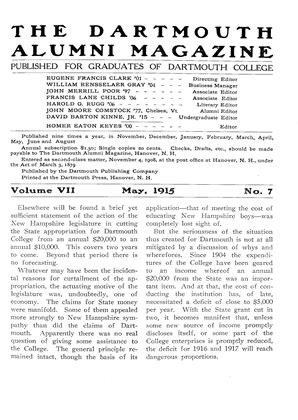A group of undergraduates representing Dartmouth will serve as ambulance drivers in the war zone of northern France this summer. At a mass meeting in Webster Hall on April 16, students and faculty launched a campaign for funds for the purchase of Ford motor ambulances, of the type recommended by the American Red Cross which are now in general use in Europe. Manned by volunteers from the present undergraduate body, these ambulances will represent the College's contribution towards allaying the frightful suffering and agony abroad, which, according to the prophecies of strategists, will become even more horrible with the progress of the spring and summer campaigns.
The relief project took definite shape when a cable message expressing approval of the plan arrived from the American Ambulance Hospital of Paris —an institution in which Edward Tuck '62 and Dr. E. H. Lines '82 are interested. William Hereford, of J. P. Morgan and Company, representatives of the American Ambulance Hospital, received the cable in response to a letter asking if ambulances manned by Dartmouth students would be accepted by this organization. Upon receipt of the affirmative reply, the committee in charge of the undertaking placed the issue before the undergraduates in the mass meeting. At this meeting, Cranston Brenton, New York, war relief agent for the American Red Cross, graphically portrayed the desperate plight of the wounded combatants, and the utter lack of facilities for their care. The other speakers were Prof. E. j. Bartlett, Prof. B. T. Marshall, and C. B. Jordan '15.
The project as outlined at present calls for an expenditure of $700.00 with a. possible addition of $400.00 for maintenance for each ambulance laid down ready for service in Paris. About $1,500.00 has already been either contributed or pledged by the undergraduates and faculty, and. according to conservative estimates probably $2,000.00 will be contributed in Hanover. All funds contributed will go to the purchase of the motor ambulances, the volunteer drivers paying their own transportation and personal expenses. The Dramatic Association also staged a play for the benefit of the fund.
The American Ambulance Hospital in Paris, with which the Dartmouth unit will be affiliated, ranks as one of the foremost military hospitals in the world. Besides the headquarters in Paris, it maintains a branch at Jouilly, thirty miles nearer the battlefields. The current practice is to station volunteer ambulances first at Paris, then at Jouilly, and finally, at the front. Already many American institutions, societies, and individuals have given motors for service in this organization. Among the donors are Columbia University, Princeton, Phillips Andover, and the A. D. Club at Harvard, it seems, however, that the plan of manning the machines with volunteers from the contributing institutions, is as yet unique to Dartmouth.
The method of selecting the men who will go abroad, two of whom will be sent with each ambulance, forestalls any possible criticism as to personal fitness or favoritism. The volunteers must be physically strong, must know how to drive and take care of an automobile, and must be able to meet an expense of about $300,00, $200.00 being for transportation, $50.00 for personal equipment, and $50.00 for incidentals. Board and lodging is furnished by the American Ambulance Hospital. A committee of nine, composed of both faculty members and students, will select from the volunteers those men who are to represent Dartmouth.
Miss Mabel T. Boardman, when interviewed in Washington about the Dartmouth project, expressed hearty approval of the plan, and wrote a letter of encouragement to the students in which she said in part:
"If the students of Dartmouth desire to be of help to the wounded in this great war today, I am sure nothing would be more acceptable than these motor ambulances. They can be utilized whenever trains of wounded are brought in, in taking the men to the hospitals, or they can be used nearer the front in transporting men from the battlefield to hospitals or hospital trains, with the least degree of suffering possible. When not occupied in this way they could be utilized to carry from the base of supplies the greatly needed materials to the many small hospitals scattered about and that suffer greatly from lack of such supplies.
"The men that are falling in battle are many of them the ages of the men at our colleges and universities, and it would seem a most appropriate gift for the men of Dartmouth to make to help in relieving the suffering that is so great in Europe today."
(Signed) Yours sincerely,
Acting Chairman
The undertaking is being conducted by the following committees:
The executive committee: G. B. McClary, chairman, Prof. E. J. Bartlett, Prof. B. T. Marshall, Dr. Gile, Dean Laycock, W. M. Ross, Secretary Knapp, and C. E. Griffith, Jr., '15. Faculty council: Prof. E. J. Bartlett, Prof. B. T. Marshall, Prof. L. H. Dow, Dean Laycock, and Prof. F. H. Dixon. Alumni representatives: Prof. F. P. Emery, Prof. E. F. Clark, Prof. W. R. Gray, and Secretary Knapp. Student board: C. E. Griffith, Jr., '15, P. W. Loudon, D. C. Bennink 'l5, C. B. Jordan, Jr., '15, L. A. Whitney '15, N. L. Milmore '15, A. M. Behnke '16, E. C. Riley '16.
Contributions to the Ambulance Corps Fund will be very gladly accepted, and should be sent to Edwin J. Bartlett, Treasurer.
 View Full Issue
View Full Issue
More From This Issue
-
 Article
ArticleFOOTBALL AT DARTMOUTH
May 1915 By Howard Murray Tibbetts '00 -
 Books
BooksThe Real Turk
May 1915 By C. H. H. -
 Article
ArticleTHE REVIEW
May 1915 By Wilder D wight Quint '87 -
 Class Notes
Class NotesCLASS SECRETARIES
May 1915 -
 Article
ArticleTHE CHRISTIAN ASSOCIATION'S EXHIBIT
May 1915 -
 Article
ArticleElsewhere will be found a brief yet sufficient statement
May 1915








